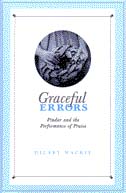

Reading Pindar's poems with their public performance in mind, Hilary Mackie suggests that the poet was forced to tread a precarious path: weighing the interests of various groups of audience members against one another, balancing praise of the victorious athlete with praise of the deeds of mythic heroes, and catering at the same time to an uncertain future. Mackie's new approach illuminates apparent contradictions in the poet's pronouncements by bringing to the fore the variety of messages conveyed in his wishes and prayers. Her innovative examination of the moment-to-moment dynamic between Pindar and his audience shows that the poet's performance often contained one message for the victor and his family, and quite another for the gods.
Graceful Errors significantly changes our perspective on Pindar's work, providing a lucid appreciation of Pindaric poetry that takes into account the oral context of these poems' performance. It will be of interest not only to classicists but also to scholars and students interested in oral performance, the social function of poetry, and the role and status of poets in traditional cultures, whether ancient or modern.
Hilary Mackie is Associate Professor of Classics at Rice University.

The preeminent lyric poet of ancient Greece.
Of the Greek lyric poets, Pindar (ca. 518–438 BC) was “by far the greatest for the magnificence of his inspiration” in Quintilian’s view; Horace judged him “sure to win Apollo’s laurels.” The esteem of the ancients may help explain why a good portion of his work was carefully preserved. Most of the Greek lyric poets come down to us only in bits and pieces, but nearly a quarter of Pindar’s poems survive complete. William H. Race now brings us, in two volumes, a new edition and translation of the four books of victory odes, along with surviving fragments of Pindar’s other poems.
Like Simonides and Bacchylides, Pindar wrote elaborate odes in honor of prize-winning athletes for public performance by singers, dancers, and musicians. His forty-five victory odes celebrate triumphs in athletic contests at the four great Panhellenic festivals: the Olympic, Pythian (at Delphi), Nemean, and Isthmian games. In these complex poems, Pindar commemorates the achievement of athletes and powerful rulers against the backdrop of divine favor, human failure, heroic legend, and the moral ideals of aristocratic Greek society. Readers have long savored them for their rich poetic language and imagery, moral maxims, and vivid portrayals of sacred myths.
Race provides brief introductions to each ode and full explanatory footnotes, offering the reader invaluable guidance to these often difficult poems. His Loeb Pindar also contains a helpfully annotated edition and translation of significant fragments, including hymns, paeans, dithyrambs, maiden songs, and dirges.

The preeminent lyric poet of ancient Greece.
Of the Greek lyric poets, Pindar (ca. 518–438 BC) was “by far the greatest for the magnificence of his inspiration” in Quintilian’s view; Horace judged him “sure to win Apollo’s laurels.” The esteem of the ancients may help explain why a good portion of his work was carefully preserved. Most of the Greek lyric poets come down to us only in bits and pieces, but nearly a quarter of Pindar’s poems survive complete. William H. Race now brings us, in two volumes, a new edition and translation of the four books of victory odes, along with surviving fragments of Pindar’s other poems.
Like Simonides and Bacchylides, Pindar wrote elaborate odes in honor of prize-winning athletes for public performance by singers, dancers, and musicians. His forty-five victory odes celebrate triumphs in athletic contests at the four great Panhellenic festivals: the Olympic, Pythian (at Delphi), Nemean, and Isthmian games. In these complex poems, Pindar commemorates the achievement of athletes and powerful rulers against the backdrop of divine favor, human failure, heroic legend, and the moral ideals of aristocratic Greek society. Readers have long savored them for their rich poetic language and imagery, moral maxims, and vivid portrayals of sacred myths.
Race provides brief introductions to each ode and full explanatory footnotes, offering the reader invaluable guidance to these often difficult poems. His Loeb Pindar also contains a helpfully annotated edition and translation of significant fragments, including hymns, paeans, dithyrambs, maiden songs, and dirges.


Hailed by Horace and Quintilian as the greatest of Greek lyric poets, Pindar has always enjoyed a privileged position in the so-called classical tradition of the West. Given the intense difficulty of the poetry, however, Pindaric interpretation has forever grappled with the perplexing dilemma that one of the most influential poets of antiquity should prove to be so dark.
In discussing both poets and scholars from a broad historical span, with special emphasis on the German legacy of genius, Soliciting Darkness investigates how Pindar’s obscurity has been perceived and confronted, extorted and exploited. As such, this study addresses a variety of pressing issues, including the recovery and appropriation of classical texts, problems of translation, representations of lyric authenticity, and the possibility or impossibility of a continuous literary tradition. The poetics of obscurity that emerges here suggests that taking Pindar to be an incomprehensible poet may not simply be the result of an insufficient or false reading, but rather may serve as a wholly adequate judgment.
READERS
Browse our collection.
PUBLISHERS
See BiblioVault's publisher services.
STUDENT SERVICES
Files for college accessibility offices.
UChicago Accessibility Resources
home | accessibility | search | about | contact us
BiblioVault ® 2001 - 2024
The University of Chicago Press









